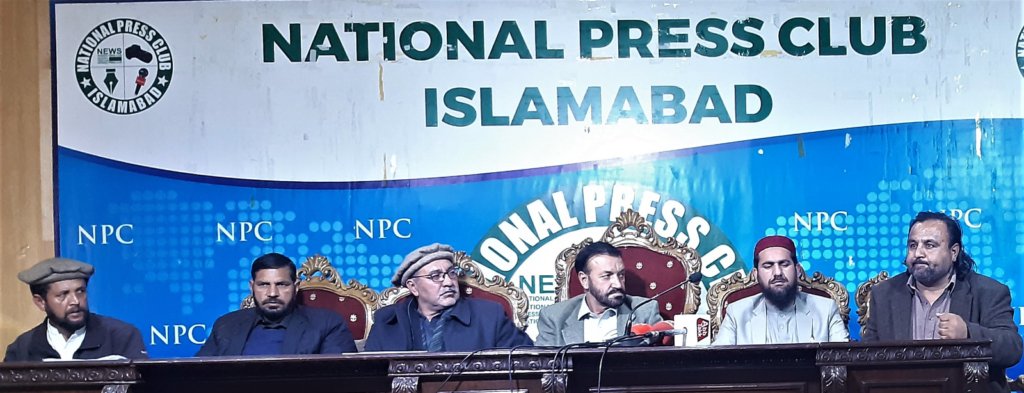The leadership of Awami Action Committee Gilgit-Baltistan (AACGB) – a conglomerate of half a dozen progressive and nationalist parties – has expressed outrage at the unbridled capture of land, pillage of natural resources of the mountainous region, imposition of illegal taxes on the locals, cut in wheat quota and withdrawal of subsidy on the essential commodity and hike in power tariff.
Local representatives adopted the stance that these anti-people decisions by the federal as well as the Gilgit-Baltistan’s regional governments and super inflation have made the life of two million people miserable.
They have been forced to come on roads to protest the government’s anti-people policies, they said.
The leaders expressed these views at a news conference at the National Press Club here in the federal capital.
The AACGB chairperson Fida Hussain, former chairman Maulana Sultan Raees, Awami Workers Party chairman Baba Jan, AACGB presidents of Baltistan, Najaf Ali, spoke to the media persons.
Presidents of AACGB Diamer and Ghizer divisions Shabbir Ahmed and Musa Madad, and Fida Esar of Gilgit-Baltistan United Movement were also present.
“For the past 75 years, the constitutional limbo, lack of democratic and fundamental human rights, colonial bureaucratic system of government, lack of independent judiciary and empowered assembly and state coercion have increased the sense of deprivation of the people,” said Najaf Ali.
According to him Gilgit-Baltistan is a disputed region and is linked to the Kashmir issue. There is no independent justice system at the local level. All natural resources, including water, minerals, forests, and pastures and lands are the common property of the people. The Pakistani government has no legal authority and power to grab public land and resources.
But the local elite class and the bureaucracy are engaged in plundering these resources by granting leases to the non-local capitalists and powerful state organs for mining and setting up private powerhouses without the consent of the local people, said Mr Najaf.
“We warn the rulers that if this is not stopped and the illegal leases already granted were not canceled, the Awami Action Committee will launch a protest movement in G-B and across the country.”
He demanded that the disputed region must be granted internal autonomy as per UN resolutions elections for a constituent assembly and setting up an independent judiciary and holding of local bodies elections to end the sense of deprivation among the local people.
Criticising the apathy of the mainstream media, he said “through this platform, we want to convey these issues to the government and democratic forces and human rights bodies and international organizations.
“It is with great regret that we are compelled to say that instead of highlighting the miseries of the people of G-B and these issues, the mainstream media is busy showing the power wrangling between different parties of the ruling class and frivolous debate on TV channels.
The mountains, glaciers, and beautiful valleys of Gilgit-Baltistan are important for the media and the rulers but they do not see the problems of the more than two million people living in poverty.
The cut of 2 million bags of wheat quota, withdrawal of subsidy on the commodity, and increase in fuel and electricity prices have driven up prices of all essential commodities beyond the purchasing power of the people, especially the poor working class, said Mr Najaf.
All the top bureaucrats and public representatives prefer to stay in Islamabad spending public money on their luxurious living. He demanded a drastic cut in the size of the bureaucracy, their perks, and the withdrawal of paramilitary forces from G-B to save substantial public money and divert billions towards public welfare.
Talking about the sorry situation in the health sector, AWPGB chief Comrade Baba Jan said 90 percent of the far-flung valleys in the 10 districts of Gilgit-Baltistan lack basic health facilities. Even the existing hospitals lack basic facilities. Due to this, the patients are forced to go to distant cities for treatment.
The lack of educational and internet facilities and prolonged load-shedding compel hundreds of thousands of young people to move away from their parents to the cities and face many problems.
Najaf Ali said that there are 17 assistant commissioners only in Baltistan Division but there is not a single gynecologist and a specialist doctor for the population of over 800,000.
They also demanded that small hydropower plants and run-of-river powerhouses should be constructed in every valley on an emergency basis to solve the chronic power crisis and stop the use of thermal generators that are damaging the environment. This is also a major source of corruption for the bureaucracy which should be stopped forthwith.
They also demanded a ban on the construction of big hotels and the provision of special electricity connections to them.
Responding to a question, Sultan Raees said the bureaucracy creates division among the people and the political forces on ethnic and sectarian lines to defuse public anger and movement for rights.
Those who demand basic rights and do peaceful struggle are implicated in trumped-up cases and prosecuted under the draconian anti-terrorism laws; their names are placed on Schedule 4 of the ATA, they said.
They also demanded the opening of all historical routes and passes between Gilgit-Baltistan and Kashmir, including Skardu-Kargil Road, and Shounter pass for trade and tourism. They also demanded handing over of Sost Dry Port to the local people from NLC.
They demanded an increase in compensation for the affected people of the Diamer-Bhasha Dam whose houses and land will be submerged in the reservoir. Local youth should be given preference in jobs in this project.
The compensation for all the lands affected by the Karakoram Highway reconstruction, Shandur-Ghizer Road, and other communication projects should be given in full. Well-equipped modern health facilities should be provided in all districts and villages with medical specialists and medicines. Education, employment, and sports facilities should be provided to the youth at their doorstep.

